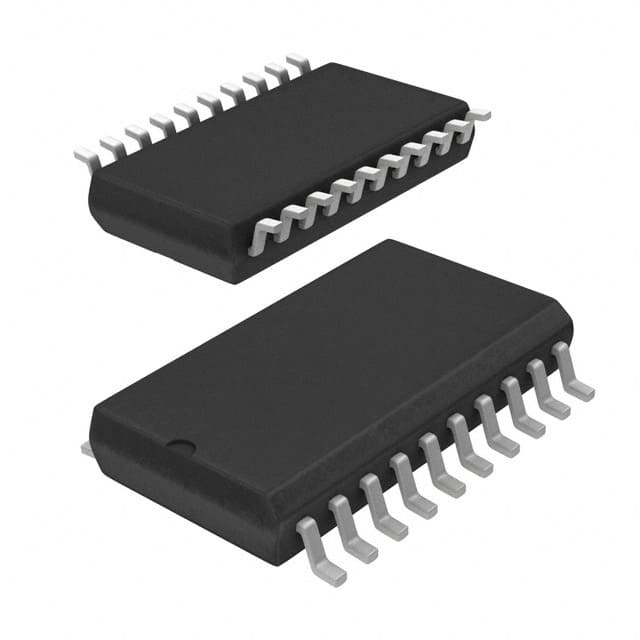TLC7226IDWR
Product Overview
Category: Integrated Circuit (IC)
Use: The TLC7226IDWR is a digital-to-analog converter (DAC) IC that converts digital signals into analog voltages. It is commonly used in various electronic devices and systems where precise analog voltage outputs are required.
Characteristics: - High resolution: The TLC7226IDWR provides 12-bit resolution, allowing for fine-grained control of analog output voltages. - Low power consumption: This IC operates at low power levels, making it suitable for battery-powered applications. - Wide operating voltage range: It can operate within a wide voltage range, typically between 2.7V and 5.5V. - Small package size: The TLC7226IDWR comes in a small surface-mount package, making it suitable for space-constrained designs. - Multiple channels: It features multiple independent DAC channels, enabling simultaneous conversion of multiple digital inputs to analog outputs.
Package and Quantity: The TLC7226IDWR is available in a SOIC (Small Outline Integrated Circuit) package. It is typically sold in reels or tubes containing a specific quantity, such as 250 or 3000 units per reel.
Specifications
- Resolution: 12 bits
- Number of Channels: 8
- Supply Voltage Range: 2.7V to 5.5V
- Operating Temperature Range: -40°C to +85°C
- Output Voltage Range: 0V to Vref (supply voltage)
- Digital Interface: Serial (SPI) or Parallel
- Package Type: SOIC-20
Pin Configuration
The TLC7226IDWR has a total of 20 pins arranged in a specific configuration. Here is the detailed pinout:
Pin 1: VDD
Pin 2: OUT0
Pin 3: OUT1
Pin 4: OUT2
Pin 5: OUT3
Pin 6: OUT4
Pin 7: OUT5
Pin 8: OUT6
Pin 9: OUT7
Pin 10: AGND
Pin 11: VREF
Pin 12: REFOUT
Pin 13: SCLK
Pin 14: SDI
Pin 15: CS
Pin 16: SHDN
Pin 17: DGND
Pin 18: NC (No Connection)
Pin 19: NC (No Connection)
Pin 20: VDD
Functional Features
- High-resolution digital-to-analog conversion: The TLC7226IDWR provides precise conversion of digital input signals to analog output voltages with a resolution of 12 bits.
- Multiple independent channels: It features eight independent DAC channels, allowing for simultaneous conversion of multiple digital inputs to analog outputs.
- Flexible interface options: The IC supports both serial (SPI) and parallel interfaces, providing flexibility in connecting to various microcontrollers or digital systems.
- Power-saving mode: The SHDN pin allows the device to enter a low-power shutdown mode when not in use, reducing power consumption.
Advantages and Disadvantages
Advantages: - High resolution enables accurate analog voltage generation. - Multiple channels allow for simultaneous conversion of multiple digital inputs. - Low power consumption makes it suitable for battery-powered applications. - Wide operating voltage range provides flexibility in different power supply scenarios. - Small package size saves space in compact designs.
Disadvantages: - Limited output voltage range compared to some other DACs. - Lack of built-in reference voltage source may require an external reference voltage.
Working Principles
The TLC7226IDWR operates based on the principle of digital-to-analog conversion. It takes digital input signals and converts them into corresponding analog output voltages. The IC utilizes a combination of resistors and switches to generate the desired analog voltage levels based on the digital input values.
Application Field Plans
The TLC7226IDWR finds applications in various fields where precise analog voltage outputs are required. Some potential application areas include: - Audio equipment: It can be used in audio systems for volume control, tone adjustment, or waveform generation. - Industrial automation: The IC can be employed in industrial control systems for generating analog control signals. - Test and measurement instruments: It can be utilized in test and measurement devices for generating reference voltages or calibration signals. - Communication systems: The DAC can be used in communication systems for signal modulation or demodulation purposes.
Alternative Models
There are several alternative models available that offer similar functionality to the TLC7226IDWR. Some notable alternatives include: - MCP4921: A 12-bit DAC with SPI interface from Microchip Technology. - MAX521: A 12-bit DAC with I2C interface from Maxim Integrated. - AD5621: A 12-bit DAC with SPI interface from Analog Devices.
These alternative models provide comparable resolution, channel count, and interface
Senaraikan 10 soalan dan jawapan biasa yang berkaitan dengan aplikasi TLC7226IDWR dalam penyelesaian teknikal
Sure! Here are 10 common questions and answers related to the application of TLC7226IDWR in technical solutions:
Question: What is the TLC7226IDWR?
Answer: The TLC7226IDWR is a 16-channel, 8-bit digital-to-analog converter (DAC) with serial interface.Question: What is the operating voltage range of the TLC7226IDWR?
Answer: The operating voltage range is typically between 2.7V and 5.5V.Question: How many channels can the TLC7226IDWR control?
Answer: It can control up to 16 channels individually.Question: What is the resolution of the DAC in the TLC7226IDWR?
Answer: The DAC has an 8-bit resolution, providing 256 discrete output levels.Question: Can the TLC7226IDWR be used for both analog and digital applications?
Answer: Yes, it can be used in both analog and digital applications.Question: Does the TLC7226IDWR have built-in power-on reset circuitry?
Answer: Yes, it has a power-on reset circuit that ensures all outputs are at zero volts during power-up.Question: What is the maximum data transfer rate supported by the TLC7226IDWR?
Answer: The maximum data transfer rate is typically 30 MHz.Question: Can the TLC7226IDWR be cascaded to control more than 16 channels?
Answer: Yes, multiple TLC7226IDWR devices can be cascaded together to control more than 16 channels.Question: Is the TLC7226IDWR compatible with microcontrollers and other digital devices?
Answer: Yes, it has a serial interface that is compatible with microcontrollers and other digital devices.Question: What are some common applications of the TLC7226IDWR?
Answer: Some common applications include industrial automation, motor control, audio systems, and instrumentation.
Please note that these answers are general and may vary depending on specific use cases and requirements.


